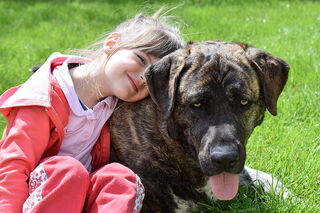Play
For a Better-Behaved Child, Get a Dog
Young kids with a family dog are less likely to have conduct and peer problems.
Posted July 15, 2020 Reviewed by Gary Drevitch

It is not easy to raise a child. Although most of us understand the fundamentals of providing adequate nutrition and teaching children basic sanitary practices, when it comes to preventing misbehaviours and shaping a child to behave in a pleasant and socially acceptable way, many parents feel somewhat lost. Without any psychological training, parents often find that teaching a child good conduct, how to get along with their peers, and how to act considerately toward others to be a daunting prospect. However, if we can believe some new research which comes out of Australia, help may be at hand, and surprisingly it comes with four feet and a tail. Furthermore, it can start improving the social behavior of a child even before he or she reaches the age of five.
A lot of research has pointed out the developmental benefits for children of a pet dog. Some of this has suggested that dog ownership can help children learn responsibility, independence, and empathy, and may even help with language development and verbal skills. Most of this research has been done on relatively small samples of children who were already of school age. A research team headed by Elizabeth Wenden from the School of Population and Global Health at the University of Western Australia in Perth set out to see if there were social and behavioral benefits of dog ownership using a large sample of families, and specifically directing their investigation toward young children below the age of five years.
The investigative team gathered data from 1,646 families in the Perth metropolitan area. They chose families that contained a child between the ages of 2 and 5 (average age 3.3 years). In the test group, 686 families owned a dog, while 960 did not. The researchers administered a commonly used psychiatric assessment protocol which was designed to measure the social and emotional well-being of children.
One cluster of behaviors which the team assessed involved the child's conduct. These data determined whether the child was generally obedient, or if the child tended to misbehave by lying, getting into fights, stealing, or having temper tantrums. The impact of living with a family dog was quite large on this cluster of conduct related behaviors for the children in this study. In fact, there was a 30 percent decrease in conduct problems for the families owning a dog, as compared to families that did not have a canine pet.
A second cluster of behaviors that investigators looked at involved the relationships between the child and his or her peers. Specifically researchers determined whether the child tended to avoid socializing with others and thus was mostly solitary, whether the child found himself or herself in situations where it might be frequently bullied, or if he or she was considered to be a good friend and popular with other children. Once again there were significant benefits found for families that owned a dog, with a 40 percent improvement in peer-related social behaviors as compared to children in non-dog owning families.
Another important set of qualities measured involved what psychologists call "prosocial behaviors." These include the qualities of caring, helping out, sharing, being kind to other children, and usually being considerate of other individuals. These positive behaviors were 34 percent more likely in the children of dog-owning families.
When it comes to prosocial behaviors certain activities specifically involving the dog seemed to produce an even stronger positive effect. Investigators found that the benefits of dog ownership were bumped up to a 45 percent improvement level if the child and his or her family walked the dog together at least once a week. If the child engaged in active play with the family dog 3 or more times a week, this improvement skyrocketed to 74 percent over the prosocial behaviors observed in non-dog owning families.
Owning a dog was not a panacea for all aspects of behavior. It had no significant effects on certain emotional problems, such as whether the child tended to worry, be fearful, or be clingy, and it also had no effects on whether the child tended to be "hyper" in the sense of being restless, fidgety, or distractible. However, one really can't expect that interacting with a dog will be a cure for everything that might go wrong with a child.
The investigators summarize the positive aspects of their findings by saying: "This study investigated the relationship between dog ownership and pre-school children's social-emotional development. We found that pre-school children with a family dog were less likely to have conduct problems, peer problems, and had a lower overall difficulties score than children from non-dog-owning families."
Remember we are simply talking about introducing a dog into a household which contains a young child in the 2-to-5-year-old age range. We are not requiring the family to do anything other than allowing the child to interact with, play with, and occasionally go out on walks with their pet. No additional psychological training is given to the family to provide them with better parenting skills. Nonetheless the simple presence of this pet dog seems to produce improvements in the behavior and comportment of children by an average of more than 30 percent. Not a bad return for the investment in the bit of kibble and water needed to sustain a family dog.
Copyright SC Psychological Enterprises Ltd. May not be reprinted or reposted without permission.
Facebook image: encierro/Shutterstock
References
Wenden, Elizabeth J., Lester, Leanne, Zubrick, Stephen R., Ng, Michelle, Christian, Hayley E. (2020). The relationship between dog ownership, dog play, family dog walking, and pre-schooler social–emotional development: findings from the PLAYCE observational study. Pediatric Research, https://doi.org/10.1038/s41390-020-1007-2




